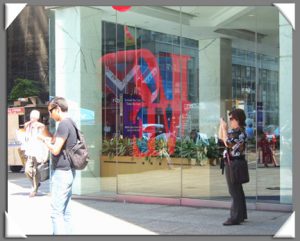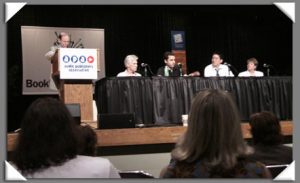After another summer of sweltering heat and daily smog alerts, I especially enjoyed the weather today here in Atlanta. It’s one of those glorious pre-fall days with postcard-blue skies. I say “pre-fall” because the temperatures are still in the 80s, but the late date on the calendar gives me hope that the crisp air of fall is soon on the way.
I was in the car earlier this afternoon when I heard a radio spot that sounded very familiar. I admit that I always feel a flush of pleasure when I unexpectedly hear my voice on the airwaves. Today, though, it was someone else’s voice presenting copy that I also had prepared in a recent audition. Since I obviously was not selected for that job, I listened closely to discern what the producer might have been thinking during the casting process.
A voice-over actor will audition far more than she will be hired. I don’t think about auditions unless I am selected for the job or have one of those lucky times like today when I hear the voice talent in the produced spot. In those cases, I like to analyze the coloration and stress on words and compare the broadcast spot with the audition that I submitted. One time, I heard a man’s voice on TV reading copy the same copy I had used. It’s easy to understand the differences between my read and a man’s version! It’s not so easy to distinguish between my performance and that of another female.
Today, I thought the reads between my audition and the produced spot were very similar. We were closely matched with our phrasing. She stressed one word that I didn’t stress in my audition. Maybe that stress was her idea, or maybe she did it due to direction. The last line was changed, so I don’t know whether the writer modified it or the talent perhaps ad-libbed it in her audition. In either case, I did think it was a better ending line.
The biggest difference I noticed was one I heard with her very first word — the difference of tonal quality. Her voice was a higher pitch than mine. C’est la vie. Another talent being chosen for that job or any job doesn’t take anything away from me or cause me any negative feelings.
While I audition relentlessly for voice-over roles with the scripts from my agent and on-line casting services, much of my work is obtained through my own marketing efforts. Following an inquiry several months ago, I received an e-mail that stated the following:
However, at this time, the creative team did not feel that your voice was a fit for our voicing needs.
It means I need to make more inquiries with other organizations. I also could follow up with this company at a later time as their needs may change. It does not mean that I was rejected in any way.
I don’t accept every project offered to me. I may have a conflict, know the client to be a price-shopper or not feel comfortable with the words that would be coming out of my mouth. Yes, the scripts are all acting, but it’s still me who breathes life into the words and utters the sounds. I don’t want or need any job badly enough to compromise my own integrity.
By the same token, I know that my voice is not right for every project. My age and vocal tone passed the 20-year mark…well, let’s just say that birthday was a while back. The writer often has an idea of the pitch range for the words. The producer may have hired someone with a voice like mine in the past and wants something different. If a true 20-year-old voice is wanted, I won’t be the one who is hired.
It would be oh-so-easy to feel rejected when I don’t win the job. I don’t know why I am not selected for the jobs, but I don’t lose sleep over them. My job is to market my talents and audition to the best of my ability. Negative feelings about my performance or skills will only cause my performance and skills to degrade in reality. I choose to feel that I am selected for those parts and projects that are right for me.
The best explanation that I have heard about the selection versus rejection philosophy is in the Voices.com Voice Over Experts podcast with Joan Baker, in which Joan Baker and her guest Rudy Gaskins discuss the myth of rejection. Baker rightly describes the notion of
rejection as a self-imposed punishment that no actor has to take on!
The changing weather reminds me to be grateful that I can enjoy each new day. With each new day are new opportunities to market myself, audition and perform voice-over jobs. Believe me, those conditions create a forecast for a bright and sunny career!




